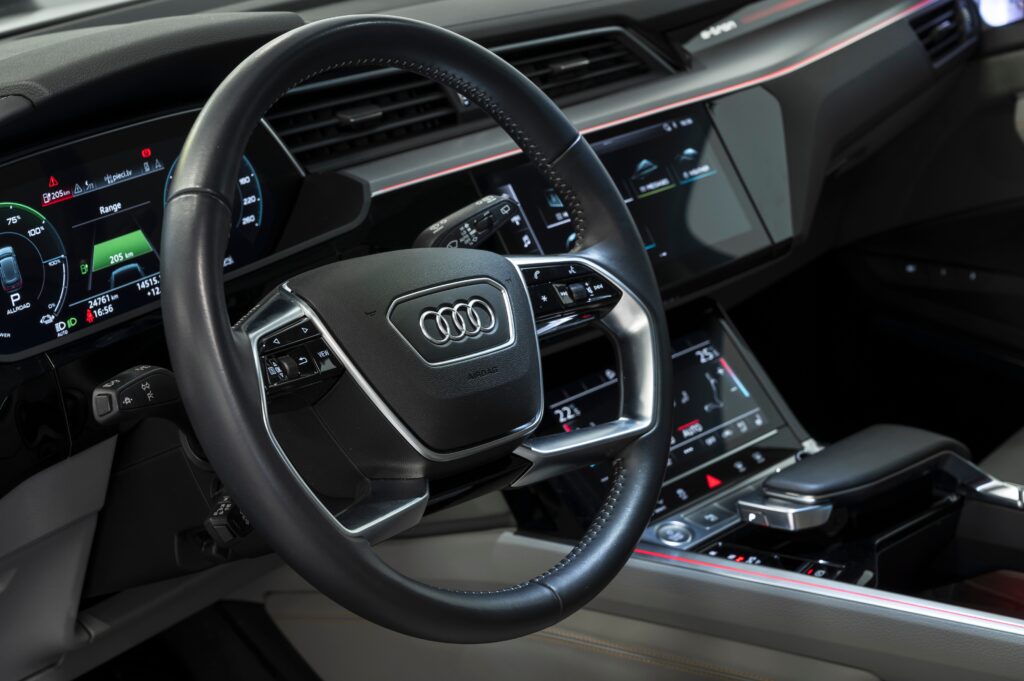German automaker Audi reported a significant revenue increase for the first quarter of 2025, reaching €15.4 billion, a 12.4% rise compared to Q1 2024. This growth was primarily fueled by a surge in battery electric vehicle (BEV) sales, even amidst a competitive and economically uncertain global automotive market. Despite challenges such as rising production costs and regulatory changes, Audi’s electric models played a pivotal role in driving revenue.
Increased Demand for Electric Vehicles
Audi’s performance in the electric vehicle market showed impressive results, with 46,371 BEVs delivered worldwide in Q1 2025, marking a 30.1% year-on-year increase. Significant demand spikes were seen in several European countries, with France leading the charge with a 169% increase in BEV deliveries. Other countries, such as Switzerland, the Netherlands, Norway, and Germany, also reported strong growth, with increases ranging from 59% to 120%.
This surge in electric vehicle sales comes as part of Audi’s ongoing efforts to transition its model lineup to more sustainable alternatives. Despite a slight 3.4% drop in total vehicle deliveries (383,401 units) compared to the previous year, the company’s electric models vastly exceeded expectations in key markets.
CEO Outlines Audi’s Strategic Shift
Audi CEO Gernot Döllner discussed the company’s efforts to reposition itself in early 2025, emphasizing that the first quarter’s results were part of a broader transformation strategy. He noted that the company had made significant strides in increasing flexibility, speed, and productivity at its German plants. This was further supported by a March agreement with the works council, which Döllner called a key milestone in Audi’s ongoing evolution.
“Although global economic conditions remain challenging, we are seeing strong order volumes and positive sales growth for our new electric models,” Döllner said in the official earnings statement published on the Volkswagen Group’s website.
CFO Stresses Efficiency and Competitiveness
Audi’s Chief Financial Officer, Jürgen Rittersberger, emphasized the need for increased efficiency and competitiveness as part of the company’s ongoing transformation. He acknowledged that while the first-quarter results were promising, the company must continue to focus on improving operations to meet the evolving demands of the market.
“Efficiency gains are essential as we navigate through challenging global conditions,” Rittersberger remarked. He also expressed confidence in Audi’s ability to adapt and restore its leadership position within the automotive industry. Audi projects its 2025 revenue to fall between €67.5 billion and €72.5 billion, with an operating margin of 7% to 9%, and net cash flow expected to range between €3 billion and €4 billion.
However, Audi did note that the financial impact of potential U.S. import tariffs and ongoing developments related to internal agreements were not yet fully accounted for in the company’s outlook.
Performance Across Regions: Europe and China Show Mixed Results
In terms of regional performance, Audi saw a notable increase in electric vehicle sales in Europe, where deliveries surged 50.4% to 25,129 units. Germany was a strong performer, with a 59% rise in BEV deliveries, totaling 8,640 units. Across Europe (excluding Germany), however, overall deliveries declined by 3%, totaling 112,707 units. The company reported a 4.8% rise in deliveries within Germany, with 48,447 units sold in the first quarter.
In North America, Audi’s deliveries dipped by 2.1% to 48,599 units, mainly due to ongoing model updates. The company’s performance in China was more challenging, with a 7% year-on-year decline in total deliveries to 144,471 units. This decline was attributed to heightened competition within the Chinese market, leading Audi to focus on expanding its electric vehicle lineup and strengthening collaborations with local partners to boost its market share in China.
Looking ahead, Audi is confident in its ability to navigate the challenges of the global automotive industry while continuing to prioritize electric vehicle development. The company remains committed to transitioning its vehicle offerings toward sustainable mobility, with significant investments in electric vehicle technology and regional partnerships.
As the automotive industry faces increasing pressure to meet sustainability goals, Audi’s strong performance in electric vehicle sales positions it well for future growth. While challenges remain, including economic uncertainties and evolving regulatory pressures, Audi’s continued focus on innovation and flexibility will play a key role in its long-term strategy.
